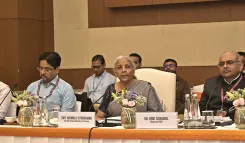Did the SC Praise Tamil Nadu for Combating Cyber Offenders with Preventive Detention?

Synopsis
Key Takeaways
- Tamil Nadu's preventive detention approach has received Supreme Court approval.
- Traditional laws are often ineffective against cybercrime.
- Preventive detention can serve as a necessary tool for public safety.
- The case highlights issues related to language and fair representation in legal processes.
- The Supreme Court will revisit the matter soon for further deliberation.
New Delhi, June 23 (NationPress) The Supreme Court on Monday commended the Tamil Nadu government for its proactive stance against cyber offenders utilizing the preventive detention framework.
"This marks a positive development as preventive detention laws are effectively employed against cybercriminals. It is a highly commendable strategy," stated a Bench comprising Justices Sandeep Mehta and Joymala Bagchi, highlighting that traditional criminal laws have not been sufficiently effective in discouraging cybercrime.
The Bench, led by Justice Mehta, was reviewing a special leave petition (SLP) lodged by the father of a detenue alleged to be a member of a cybercrime syndicate, challenging the detention order.
Previously, the Madras High Court had dismissed a habeas corpus petition, rejecting claims that the detention order breached Article 22(5) of the Indian Constitution and the protocols established under the preventive detention statute.
The Tamil Nadu Cyber Police detained the petitioner's son following a complaint from a cybercrime victim who reported being swindled out of Rs 84,50,000, with a portion of the illicit funds traced to his bank account held under the name of M/s Creative Craft.
During the investigation, it was discovered that the accused had established four companies in his name and that of his family members, opening numerous bank accounts to embezzle the defrauded money.
After the Cyber Crime Branch recommended preventive detention, the District Collector issued the detention order in August of the previous year. Later, in December 2024, the Tamil Nadu government upheld the detention, mandating that the accused remain in custody for a duration of 12 months.
The SLP presented to the Supreme Court argued that the detenue, originally from Punjab and fluent in Punjabi, received documents in Tamil, Hindi, and English, which denied him a fair chance to contest the preventive detention order. The Madras High Court dismissed this language argument, noting that while Punjabi is his mother tongue, he is proficient in English and Hindi due to his education and extended residence in New Delhi.
Moreover, the SLP contended that a single case of alleged cybercrime does not warrant his detention, as the preventive detention statute aims to prevent individuals from acting in ways that disrupt public order.
The Supreme Court is scheduled to deliberate on this issue again on Wednesday (June 25), as the counter-affidavit from the Tamil Nadu government has yet to be officially submitted.






